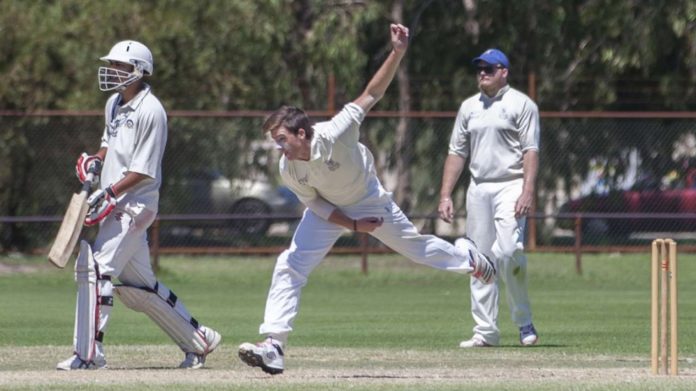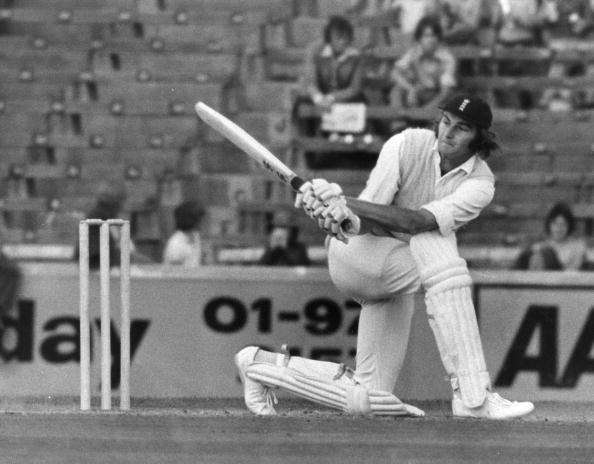.
Curtly Ambrose (West Indies) – Bass gitarist
Curtley Ambrose was an unstoppable force during the 1990s along with his country mate Courtney Walsh. Their partnership in the West Indian bowling ranks was simply outstanding; despite having a weak batting line-up, the duo of Ambrose-Walsh helped the team win many memorable matches.
Ambrose played 98 Tests and picked up 405 wickets at an average of 20.99. He also has 225 ODI scalps in 176 matches for the Windies. One of his spells, against England in 1994 where he picked up 6 wickets for 24 runs, was especially breathtaking – the Three Lions were so petrified of his bowling that they got all out for a mere 46 runs.
After retiring in 2000, Ambrose joined the “Dread and The Baldhead”, an Antiguan reggae band, as a bass guitarist.
Chris Lewis (England) – Sentenced to 13 years in prison
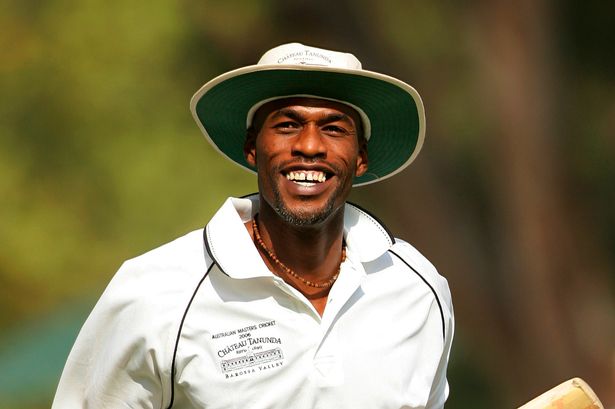
He was a talented, capable all rounder who played 32 Test matches for Englandand in a World Cup final in 1992. He won trophies during a domestic career that took him to Leicestershire, Nottinghamshire and Surrey before his professional days ended in 2008.
But it wasn’t a smooth gilded career. Born in Guyana, viewed as an outsider, a difficult character, too flamboyant, too arrogant, too lazy, too talented, Lewis was constantly bucking against authority and tradition.
‘The prat without a hat’ was how he was described when he caught sunstroke after shaving his head in the Caribbean.He didn’t like the perception of him, but incidents like turning up late to the ground for both England and then Leicestershire hardly helped.
The arrest for attempting to smuggle cocaine into the UK from St. Lucia which landed him a 13-year jail term for which he served six and a half years until his release in 2015.
But there is something nagging away. The fact that he ended up fulfilling the low expectations people had of him still hurts, and will probably never leave him.
“There is a perception to start with and people pick out moments to fit in with that perception so that they can say ‘I told you so.’ said Lewis.
“The hardest thing to deal with is that for most of my life I sat there and listened to people making judgements and talking about this and that and I used to think what on earth are these people talking about?
“Then you go and walk head first into the perception that people always had. Nightmare. Unbelievable nightmare.
“It was so poor. I was in a desperate state. When you’re in a desperate place then poor choices are made and I have to live with this label now that no-one wants.”
Lewis was a supremely athletic cricketer who had real ability with both bat and ball. And one wonders how life might have turned out were he 29 rather than 49 today.
There are tough times ahead. He’d like a future in the game, but ‘only if the game wants me’. He is helping educate players with the PCA and hopes to turn his story into a positive one.
He has remorse and regret for the ‘crazy’ decision he made, but thankfully there is little bitterness about his cricket career which most players would bite your hand off to have.
“I was having the time of my life in the 90s,” he admitted. “I was one of the fortunate ones. We might not have had central contracts and things like that, but we had more in place than most.
Chris Old (fish and chips shop owner)
Chris Old was a regular figure in the English bowling attack from 1972 to the early 80s. He made his debut in Kolkata in December 1972, and his first wicket was of the great Sunil Gavaskar. He picked up six wickets in the match and scored 50 runs across both innings, but ended up on the losing side as India won by 28 runs.
After retirement, he ran a fish and chips restaurant with his wife Letita on Praa Sands, Cornwall.
Old’s most prominent contribution to the England side was probably during the 1981 Ashes when he put up a 67-run partnership with Ian Botham for the 9th wicket and also took the crucial wicket of Alan Border for a duck.
He is the only cricketer who played in both the centenary matches against Australia – in 1977 at Melbourne and in 1980 at Lord’s.
David Sheppard (bishop)
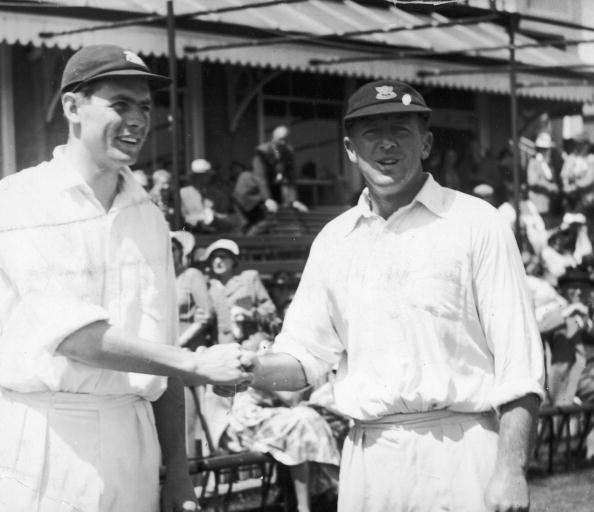
David Sheppard was an England batsman who became an ordained minister and rose to become the Bishop of Liverpool. A graceful driver, Sheppard came to the fore on Cyril Coote’s pluperfect batting pitches at Fenner’s. For the strong Cambridge University side of 1950 Sheppard (227) and John Dewes (183) shared an opening stand of 343 against the West Indian tourists – in response Everton Weekes hammered an unbeaten 304 out of 730 for 3 after Cambridge declared at 594 for 4. Later, in front of Sheppard’s home-county crowd at Hove, he and Dewes (212) improved on that with a stand of 349 against Sussex.
After his career came to an end, he became one of the most outspoken bishops of the Church of England. Sheppard died in 2005, after fighting a long battle with cancer.
Chris Old (England) – Fish and chips shop owner
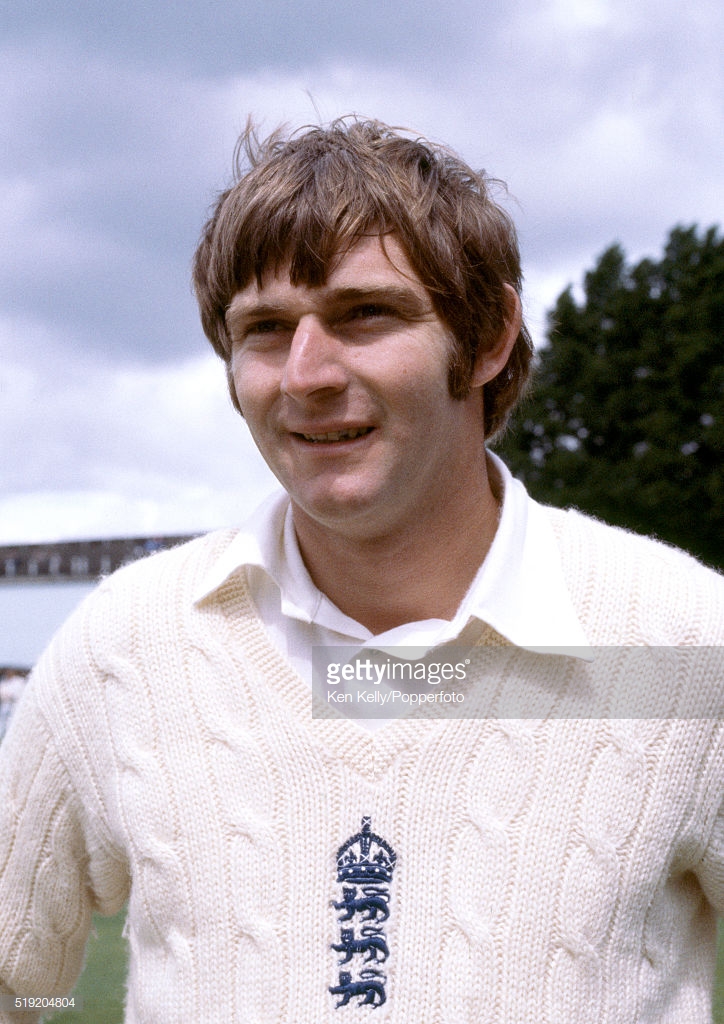
Chris Old was recognised as a regular member in the English bowling attack from the year 1972 to the early 80s. Having made his debut in Kolkata in December 1972, his first wicket was of the great Sunil Gavaskar. Despite having picked up six wickets in the match and scoring 50 runs across both innings, he sadly ended up on the losing side as India won by 28 runs.
Post retirement, he ran a fish and chips restaurant partnered by his wife Letita on Praa Sands, Cornwall.
Old’s most prominent contribution to the England side is known to be during the 1981 Ashes when he put on a 67-run partnership with Ian Botham for the ninth wicket and he also took the crucial wicket of Alan Border, for a duck.
He’s renowned as the only cricketer having played in both the centenary matches against Australia – in 1977 at Melbourne and in 1980 at Lord’s.
Arshad Khan (Pakistan) – Cab driver
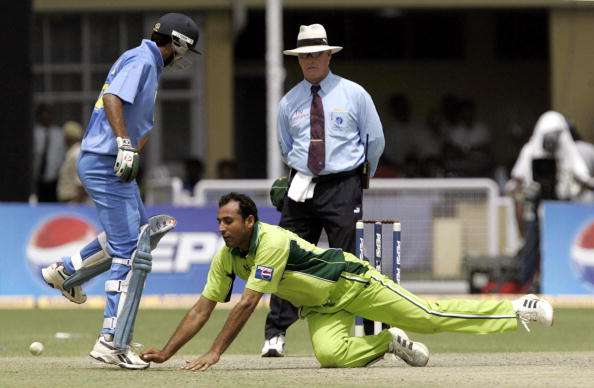
The 44-year-old cricketer played for Pakistan from 1997-2006. One of his career highlights was taking the wicket of Indian cricket maestro Sachin Tendulkar in an ODI in 2006.
Making his debut in 1997-98, former Pakistan cricketer Arshad Khan would have never imagined his life would have played out the way it did – driving a taxi in Australia.
A few days back, the tall Khan, was back in the spotlight when Ganesh Birle, who had apparently booked his Uber cab in Sydney, posted a photo of the ex-cricketer’s Uber profile.
In his Facebook post, Birle recounted his brief encounter with the right-arm offbreak bowler:
“He was the driver of our cab and we started chatting, he told me that he is from Pakistan and lives in Sydney. Also that he has been to Hyderabad many times when he was playing for Lahore Badshahs something in ICL. After which I asked him his full name and then I was shocked to see his face which I could partially recognise. I shook his hand and left.
“He was avoiding the conversation all the time, but at the same time he couldn’t help but talk about his India connection. Imagine he introduced himself as ‘I from Pakistan [sic] but I have been here in Sydney for long time now’. Also like a good Uber driver he offered us water and stuff when we sat in the car.”
According to Arshad Khan’s profile on espncricinfo.com, the 44-year-old hails from Peshawar in Pakistan and enjoyed a rather brief stint in the national side, playing nine Test matches and 58 One-Day Internationals, which ended in 2006. Both his last Test and ODI came against India at Bangalore and Rawalpindi respectively.
One of the highlights of Khan’s career was taking the wicket of batting maestro Sachin Tendulkar in an 2006 ODI versus India at Peshawar.
Khan had played for the following teams, across all formats: Pakistan, Allied Bank, ICL Pakistan XI, Islamabad, Lahore Badshahs, Pakistan Railways, Peshawar, Peshawar Panthers, Quetta, Quetta Bears
His career effectively came to an early end after signing up for the Indian Cricket League, when several Pakistani players were banned from representing the country in international cricket, including star openers Imran Farhat and Taufeeq Umar. However, the ban was suspended in 2009.
Chris Cairns (New Zealand) – Bus shelter washer
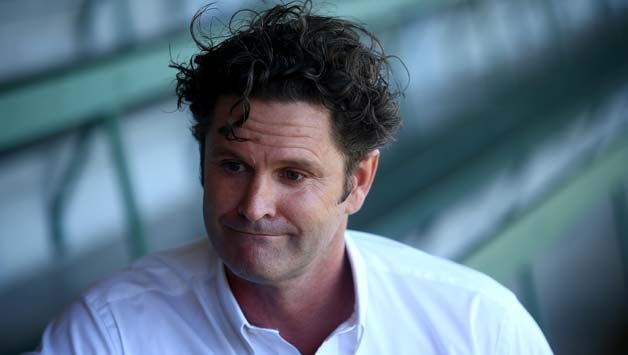
In a sad turn of events and also what many would say his fall from grace, New Zealand’s famed cricketer and once feared all-rounder Chris Cairns has taken to driving trucks and cleaning bus shelters for 17-dollar-an-hour salary.
As per reports, he decided to take up the job in order to provide for his family and meet his day-to-day expenses.
He is said to have taken up the job with the Auckland council where his work entails driving a truck that blasts water in bus shelters in the New Zealand capital.
Cairns’ wife Mel Crosser was also reported as saying that he had no choice and had to do things to provide for his family.
She said that they had to pay rent for the house in which they were living as they didn’t own one and had to pay bills like everyone else.
They, however, continue to live in Herne Bay which is said to be Auckland’s most expensive suburb.
The 44-year-old former cricketer is currently under investigation by British authorities for alleged match-fixing charges.
It was reported that New Zealand player Brendon McCullum had provided the International Cricket Council with evidence of an attempt by an unnamed, high profile player, known as ‘Player X’, to entice him into spot-fixing .
Before McCullum’s revelations, a former New Zealand cricketer Lou Vincent also made revelations about a number of matches which were targeted for spot-fixing.
Cairns issued a statement later saying that based on the limited information that he had received during the investigation, he believed that it was being alleged that he was that player. He said that the allegations against him were a complete lie.
He also went on to say that he had never approached Brendon, or anyone else, about match fixing or any other improper activity and said that ‘there were dark forces at play’ which had ‘long arms, deep pockets and great influence’.
Meanwhile, Vincent has been banned for life from playing the game.
Cairns is considered as one of the finest cricketers that New Zealand has produced. Former Australian cricketer and a legend of the game Shane Warne had once described Cairns as the best all-rounder in the world.
He played 62 Tests and scored 3,320 runs with five centuries at an average of 33.53. He also took 218 wickets at 29.40 in Tests.
Cairns played 215 one-day internationals and scored 4,950 runs at an average of 29.46 and took 201 wickets.
One of his most memorable innings was his unbeaten 102 to win the final of the 2000 ICC Knock Out Trophy for New Zealand against India in Kenya.
He also played in now defunct Indian Cricket League.
Cairns retired from Tests in 2004 and ODIs in 2006.
His father, Lance, too was a cricketer.
In 2012, Cairns won £90,000 ($146,000) in a libel action against former Indian Premier League chairman Lalit Modi in London. This was regarding a tweet alleging he was involved in match-fixing.
Earlier in 2010 he worked in Dubai as a diamond trader. He also did a stint as a commentator in a channel in New Zealand.































